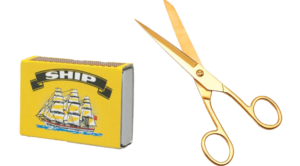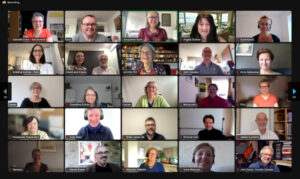Pesented at The Developing Group 7 Dec 2002
Introductory/concluding thoughts
“Are you sitting comfortably? Then I’ll begin”
(Introduction to every story told on the BBC radio programme Listen with Mother)
As this is the last Developing Group of the current series, the last one of the year, the last one at our home, and the last one in the current format, we thought we’d finish with ‘endings’. Then it occurred to us that an ending makes no sense without a beginning, hence the topic: modeling ‘Endings and Beginnings’.
Having finished the introduction let’s start with some quotations:
“Now a whole is that which has a beginning, a middle, and an end.” Aristotle
“I like a film to have a beginning, a middle and an end, but not necessarily in that order.” Jean-Luc Godard
“‘Where shall I begin, please your Majesty’ he asked. ‘Begin at the beginning’ the King said, gravely, ‘and go on till you come to the end – then stop’.” Lewis Carroll, Alice’s Adventures in Wonderland.
“As it was in the beginning, is now, and ever shall be: world without end.” The Book of Common Prayer
“This is not the end. It is not even the beginning of the end. But it is, perhaps, the end of the beginning.” Winston Churchill
“More than an end to war, we want an end to the beginnings of all wars.” F. D. Roosevelt.
“Like as the waves make towards the pebbled shore, So do our minutes hasten to their end.” William Shakespeare. Sonnet 60
To conclude we have created a few questions for you to ponder:
How do you know when something has begun?
And how do you know when it has ended?
If beginnings and ends are the ‘contextual markers’ we use to ‘punctuate’ the ongoing flow of life, what does your perception of starts and finishes highlight, and what does it neglect?
When did you begin?
Where did you come from before your beginning?
When will you end?
Where will you go after your ending?
Can there be change without an end and a new beginning?
How much does how you start something influence the how things turn out?
(N.B. Penny’s advice to people about to enter into a relationship is: “Don’t do anything in the first month that you are not prepared to do for the rest of the relationship.”)
What is a systemic view of (linear) time?
Arising from a question in the group, the group produced the following suggestions for how to end a session (especially when client doesn’t seem to ready to).
Markedly shift posture (definitely put your pen down!) and with a note of finality in your voice, say something like:
“And take all the time you need to consider … and to be ready to leave in the next few minutes”
“We’ve come to the end of our time today.”
“Between now and next time you can [assignment].”
“When you come back next time, I suggest bring …. with you.”
“I think it will be interesting for you to notice how much will change as a result of this session.”
“We’ve got 10 minutes left, what needs to happen in our last 10 minutes?”
“I don’t want to overrun again so how much notice do you need to complete on time?”
“I have another appointment at …” [as long as it is true].
Modelling beginnings and ends - Activities
Activity A – In pairs. 15 minutes each way.
Facilitate your partner to self-model their strategy for knowing when they consider today’s event started/began. Ask:
When did [today’s Developing Group] start for you?
How do you know that’s when it started?
Note any words or gestures that symbolise them having started.
Debrief in whole group:
Compare and contrast people’s models of knowing an event has started.
Activity B – Two pairs become a team of 4. (Do not specify a time for Part B)
Prepare an envelope containing strips of paper. Each strip is printed with one of the ‘beginnings’ or ‘ends’ words listed below. Each envelop to contain about 12 words from each column.
Hand an envelope to each team. Each team is to:
1. Separate the enclosed words into two groups:
about ‘beginnings’
about ‘endings’.
2. Arrange the words spatially in a sequence depicting the temporal relationships between the words.
After some groups appear to have finished and some haven’t (usually about 15 minutes) ask everyone to stop, whether they have finished on not.
Hand each team a piece of paper drawn thus:

3. Each team member marks where they were on the time line were when ‘time’ was called in the activity.
List of words about ‘beginning’ and ‘ending’ |
|
|---|---|
Arise Begin Birth Burst out Commence Creation Dawn Emerge Embark on Enter Establish Launch Lead Inception Initiate Infancy Institute Inaugurate Get going Go ahead Onset Open Origin Originate Outset Prepare Set in motion Set out Set up Source Spring Sprout Start |
Boundary Break off Call off Cease Climax Close Complete Conclude Consequence Culminate Denouement Draw to a close Edge End Epilogue Extent Extinction Finale Finish Furthermost Last Limit Margin Outcome Period Point Resolution Result Stop Tail end Terminate Tip Wrap-up |
Activity C – Pair up with someone else in your team. 15 minutes each way.
Facilitate your partner to self-model their strategy for knowing when they have (or will have) finished Part A of the activity. Start by asking them which ever question is appropriate:
How did you know you had finished/completed the ‘sorting the words’ activity?
or
How would you have known you had finished/completed the ‘sorting the words’ activity?
Note any words or gestures that symbolise them having finished:
[Examples from the group were:
- That’s it.
- That’s enough for now.
- I decided to end it.
- Time to move on.
- I just finished.
- Done it.
- Good enough.
It’s over.]
Debrief in whole group: Compare and contrast people’s model’s of knowing they have finished the activity.
Activity D – Questions to the whole group:
How many arranged the words:
Beginning/Start -> End/Finished
or
End/Finished -> Begin/Start?
What happens when swap them round in your mind?
Did you notice more of a response to some words than others (in Part B)?
If so, which had the most and least chage for you?
Do you have a preference for:
– Beginnings/starts
– Middles/durings
– Ends/finishes?
If so, put them in order of preference.
What could this tell you about who you might like to have in a work team?
Is there a relationship between your models for starts/begins and ends/finishes (Part A and Part C) and how you start/end:
– a client session?
– a conversation?
– a relationship?
– a job?
– a project?
Do any of these patterns enable you?
And do any inhibit you?
Activity E – In pairs. 45 minutes each way.
Facilitate your partner to self-model their answer to the question:
Given what you now know about yourself in relation to beginnings/starts and ends/finishes, what would you like to have happen?








